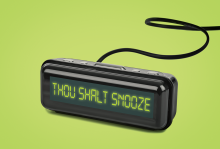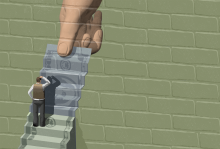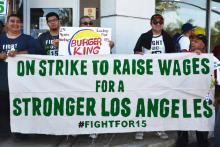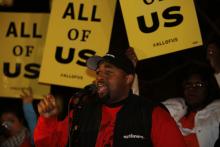Minimum Wage

IN MARCH LAST YEAR, as I was leaving a medical appointment, a nurse handed me a small, leopard-print cosmetic case with a pink ribbon attached. “A gift from us.”
This is not the kind of gift one wants to receive. I had been diagnosed with breast cancer. It was a welcome-and-sympathy gift wrapped up in one. With two young children distance-learning at home, I had considered a wide range of maladies our family might encounter—from “Zoom fatigue” to learning loss to the coronavirus itself. But not cancer.
My unpreparedness for major illness meant that I had no primary care physician, no relationship with any of the major health systems in my area, and no access to paid leave.
All this despite the fact that I was a professional advocate for family-leave policies. During the last several years, nearly all my working hours were spent researching, writing about, and promoting more humane work and family policies. I have often made this case to employers and legislators: All workers, at some point in their lives, will experience illness, frailty, or the need to care for someone else. It is wiser to anticipate and honor this aspect of humanity than to ignore it.
Now, the human in question is me.
I had not prepared for an illness requiring rest and extensive treatment. Work—both that for which I earn a living and all that goes into raising children and managing a household—played a defining role in structuring my days. Needing to not work was barely imaginable.

WHEN I TOLD my oldest son I was writing about universal basic income (UBI), he said, “All I know is that the Silicon Valley guys are pushing it, so it must be bad.” And he had a point. UBI has entered U.S. political debate most prominently as Silicon Valley’s favorite solution to a problem mostly of its own creation—massive permanent job loss due to artificial intelligence and robotics.
Under a universal basic income policy, all U.S. citizens would receive from the government a regular, permanent payment of, say, $1,000 per month, regardless of their other income or employment status. It wouldn’t get rid of the grotesque income inequality in the U.S. In fact, it wouldn’t even guarantee each person a decent standard of living. But it would get everyone up to the official poverty level.
Tech industry UBI proponents include Facebook CEO Mark Zuckerberg, Tesla founder Elon Musk, and Amazon kingpin Jeff Bezos. But the idea is most identified with former Silicon Valley entrepreneur Andrew Yang, who made it the defining issue of his long-shot campaign for the Democratic presidential nomination.
Still, UBI is an idea much older and bigger than any of its shadier supporters. While the term “universal basic income” is of fairly recent coinage, the idea that every human deserves some share of the earth’s bounty is an old one. In 1797, one of America’s founding philosophes, Thomas Paine, wrote that “the earth, in its natural uncultivated state was, and ever would have continued to be, the common property of the human race.” But, Paine continued, “the system of landed property ... has absorbed the property of all those whom it dispossessed, without providing, as ought to have been done, an indemnification for that loss.”
Paine proposed a single payment at the attainment of adulthood as compensation for the loss of our natural right to the earth. Paine was echoing the ideas of some of the earliest Christian teachers, including St. Ambrose (340-397 C.E.), who wrote: “God has ordered all things ... so that there should be food in common to all, and that the earth should be the common possession of all. Nature, therefore, has produced a common right for all, but greed has made it a right for a few.”
So universal basic income is not just the latest Silicon Valley fad. It’s rooted in an understanding of the origins of wealth and of our obligations to each other that is consistent with both our democratic and religious traditions.
But that still leaves plenty of room for debate about whether UBI is the right solution for America’s most pressing social and economic woes.
How Would UBI Work?
ECONOMIC DEBATE OVER the past 50 years has offered a variety of UBI-type proposals, from Richard Nixon’s negative income tax to the social wealth dividend proposed by some contemporary democratic socialists. The best-known and most-debated current UBI plan is the one proposed by the Yang campaign. This version of UBI rests on three pillars:
First, it is “universal.” Everyone gets it, without conditions—from Warren Buffett down to the apparently able-bodied guy with the “Please Help” sign at the exit ramp. That, of course, raises the first blizzard of objections. Why give money to rich people who don’t need it or purportedly irresponsible people who might waste it?
Paying for UBI would almost certainly involve new taxes on the wealthy, so Warren Buffett wouldn’t be keeping his $1,000 per month. As to the fear of aiding the “undeserving poor,” it’s true that historically most of the meager social benefits offered in the U.S. are means-tested (for those with the very lowest incomes) and conditional upon some form of good behavior (hours worked, clean drug tests, etc.). This has helped create a culture that stigmatizes public benefits as “welfare” and brands beneficiaries as, if not sinful, at least defective.

Lost in the debate was concern about the employees preparing the sandwich, their hours, and compensation.

Think about this: If you made the federal minimum wage of $7.25 an hour, would you be able to maintain and keep up the life you have now? If you are honest, the answer is probably no. And, if you are really honest, you’d probably say that not only would it be hard, but you’d miss many of the privileges that you are accustomed to daily.

On the anniversary of the assassination of the Rev. Martin Luther King Jr., dozens of faith leaders are calling for the U.S. presidential candidates to include a “living wage” for low-income workers in their political agendas.

The city council of Los Angeles agreed to draft a plan to raise the city's minimum wage to $15 on Tuesday, the LA Times reports.
The plan would raise minimum wage by $6 — from $9 an hour to $15 — by 2020 for some 800,000 workers.
Not all are in favor of the plan, according to the LA Times:
The council’s decision is part of a broader national effort to alleviate poverty, said Maria Elena Durazo, former head of the Los Angeles County Federation of Labor. Raising the wage in L.A., she said, will help spur similar increases in other parts of the country.
Some labor leaders have expressed dissatisfaction with the gradual timeline elected leaders set for raising base wages. But on Tuesday the harshest criticism of the law came from business groups, which warned lawmakers that the mandate would force employers to lay off workers or leave the city altogether.
“The very people [council members’] rhetoric claims to help with this action, it's going to hurt,” said Ruben Gonzalez, the Los Angeles Area Chamber of Commerce’s senior vice president for public policy and political affairs.
Los Angeles joins Chicago, San Francisco, and Seattle in raising the wage in recent months. Read more here.
ECONOMIC INEQUALITY ISN'T NEW. But this spring it became trendy, especially after Pope Francis dropped the tweet heard ’round the world in April: “Inequality is the root of social evil.”
Around the same time, Capital in the Twenty-First Century—a just-short-of-700-page book by French economist Thomas Piketty—became a best seller. Piketty, while not quite as concise as the pope, also sees wealth inequality as a problem—he focuses on its damaging effects on democratic institutions. Using extensive data, Piketty makes the case that escalating wealth inequality is built into capitalism. Without specific interventions, he writes, our politics and culture will be dominated by a small elite controlling vast amounts of primarily inherited wealth. It might create a new Gilded Age for some, but it won’t be any shinier for regular folks than the first one a century ago.
When class and economic status become news, the conversation tends to get a little shrill. Terms such as “Marxist” and “anti-business” were tossed around freely in reference to both Piketty and the pope. Some, of a more spiritual bent, sought to warn the pope and other Christians who decry inequality about the biblical sin of “covetousness,” offering reminders of the virtue of hard work. (I guess the hidden message of the parable of the rich man and the beggar at his gate is that Lazarus is envious; the real issue must be Lazarus’ poor work ethic and lack of get-up-and-go!)
But the inequality gap should be of concern to everyone, whatever their income or ideology. The point is not the fact that there are differences in wealth—those exist in any human society. And it’s not necessarily helpful or productive to seek scapegoats or assign broad characteristics to particular classes; neither poor people in general nor rich people in general are inherently noble, lazy, or scheming—temptations may vary, but good and evil can be found in people of every economic status.

THE PHRASE “POVERTY in America” still conjures up, for many of us, images of a homeless person begging on an urban street corner or a dilapidated shack in rural Appalachia. But a report this winter presents a very different picture of poverty in the U.S.: “a working mother dashing around getting ready in the morning, brushing her kid’s hair with one hand, and doling out medication to her own aging mother with the other.”
The study released in January by The Shriver Report, “A Woman’s Nation Pushes Back from the Brink,” examined the rates of financial insecurity among U.S. women. The report notes that the average woman is paid 77 cents for every dollar the average man earns, and that closing this wage gap would cut the poverty rate in half for working women and their families.
A few years ago, I was at a global women’s conference looking at the economic dimensions of women’s realities when I first heard the phrase “time poverty,” in an academic talk given by a sociologist. The phrase captured the deeply insidious economic realities that are holding back women’s equality. Most mothers know this reality as we multi-task through our day trying to hold life together for our families. Women everywhere carry the double burden of working outside the home to support their families while still doing the large majority of unpaid domestic work.
The phrase “time poverty” stuck with me and, strangely, captures my reality as a mother of three leading a relatively privileged life. For those of us in the mothering season of life, all over the world, time is not exactly on our side. From sunup to sunset, we find ourselves constantly multitasking, moving as fast as possible and feeling like the hub in the middle of everyone’s wheel. Any tiny setback—a lost pacifier, a sick child—can threaten the whole highly tenuous ecosystem of the day.


Last summer we marked the 75th anniversary of President Franklin D. Roosevelt’s signing of the Fair Labor Standards Act – a landmark law that protected children, limited the number of hours in a workweek, and established the nation’s first minimum wage. The genesis of that law is often traced back to the story of one little girl who managed to get a poignant letter in the hands of the campaigning president. The note read:
“I wish you could do something to help us girls. We have been working in a sewing factory, and up to a few months ago we were getting our minimum pay of $11 a week. Today the 200 of us girls have been cut down to $4 and $5 and $6 a week.”
During this season of Lent, as we ponder the deep meaning of our faith, we also contemplate what that faith teaches us about the inherent dignity of every human being, how it compels us to better listen to one another, and why we must always strive to better serve one another.

There have been recent talks about increasing the federal minimum wage. However, there is a group of waged workers that is often overlooked in this debate: tipped workers. They are subject to the “tipped minimum wage” — $2.13 an hour. In fact, it has been 22 years since Congress raised the “tipped minimum wage.” According to federal laws, if a waitress or waiter makes more than $30 a month in tips, they can be subject to these wages. Out of the 50 states, 18 of these states pay servers $2.13 an hour, 22 of these states pay servers less than $3.00 an hour, and only seven pay them the federal minimum wage. Due to these unfair wages, it is estimated that servers are three times as likely to live in poverty.
As the federal minimum wage stagnates at $7.25 an hour, many states have taken the lead to raise wages on their own. Where does your state stand?

Many of us believe skyrocketing income inequality is the most important economic, political, and moral issue confronting our nation. Everyone from members of Congress to Pope Francis has called for action — and now our president is leading by example.
In his State of the Union address, the president announced he would sign an executive order to raise the minimum wage to $10.10 an hour for a group of federally contracted workers. Recent research has revealed that the federal government is our nation’s leading low-wage job creator, creating more than 2 million jobs through federal contracts, loans, and grants. With this stroke of the pen, the president will begin to transform the lives of many of these Americans who are struggling to survive.
Unfortunately, many conservative commentators are criticizing the president’s action. They claim he is overstepping his legal authority and even violating his constitutional powers.


ON NOV. 5, 2013, the people of SeaTac, Wash., enacted the highest minimum wage in the country, $15 an hour, more than double the federal minimum wage of $7.25 an hour.
On Black Friday, the biggest shopping day of the year, Wal-Mart workers at more than 1,500 store locations conducted protests and informational pickets. Fast-food workers in more than 100 cities protested in front of McDonalds, KFC, and Taco Bell stores, calling for wage increases.
Across the U.S., a grassroots movement is blossoming to address the extreme inequality of wealth and wages. Led by low-wage workers and bolstered by faith community leaders, this movement is shining a spotlight on the glaring disparity of wages, wealth, and opportunity.
The wealthiest 1 percent of households, those with annual incomes over $555,000, now receives more than 21 percent of all income. Meanwhile, millions of low-wage workers subsist on the federal minimum wage, which is $15,080 a year for a full-time worker. As a result, many low-wage workers depend on charity and public subsidies such as food stamps and Medicaid to survive.
If the minimum wage had kept up with inflation since 1968, it would now be $10.74, enough to boost a family of three over the federal poverty line, according to the Economic Policy Institute. If the minimum wage had increased at the pace of worker productivity, it would be $18.72 an hour today.
Sojourners campaigns assistant Anna Hall posted a great piece last week de-bunking 5 myths about the minimum wage. One of these myths — that most minimum wage workers are suburban teenagers — was countered by the facts: nearly two-thirds of minimum wage workers are adult women.
Don’t think of a suburban teenager — think of a single mother working full time while trying to raise her children, care for her family, and make enough to pay rent, probably without any paid sick or personal days (not to mention maternity leave). Could you do that on $15,000 a year?
On Jan. 13, Maria Shriver – who, in addition to her many accomplishments, is the daughter of the statesman widely regarded as the architect of the “War on Poverty” — released a report focusing on the needs of women in the current economy.

It’s a new year, and Congress is back in session.
One of the top issues expected to be debated in 2014 is a hike to the federal minimum wage. 13 states have instituted wage increases. President Obama has supported raising the minimum wage throughout his presidency. Most recently, he shared his approval of new legislation proposed by Sen. Tom Harkin and George Miller (D-Calif.) that would raise the minimum wage to $10.10, up from it’s current $7.25.
Critics of the Harkin/Miller bill are quick to decry any wage increase. The usual arguments are trotted out to combat progressive pay for low-wage earners. Here are five commonly perpetuated myths about minimum wage. Hopefully, their exploration will shed a more accurate light on this contested issue.

If, through broader networks of power, injustice is linked, it is no less true that injustice is encountered locally in neighborhood markets, schools, churches, and even corner fast-food joints. Today it is useful to begin not with the unseen oppressive power networks in our society but with their effects on those closest to us. Just ask the single parent serving dollar ice cream at a favorite fast-food hangout if he or she would like better hourly wages.
While fast food CEOs average a daily salary of $25,000, workers at fast-food companies in New York City make only 25 percent of the money they need to survive. Single parents earning the current federal minimum wage of $7.25 an hour are, as Jillian Berman of the Huffington Post describes, not able to survive even in America’s cheapest counties. The Wider Opportunities for Women estimates that women are 50 percent more likely than men to earn the minimum wage. Compound this with the status of single motherhood and the needs of the household intensify exponentially.
Dependent on minimum wages are children, who like any other child in the U.S., deserve access to healthy food, clothing, affordable shelter, and descent education. Within the current reconfigurations taking place in the U.S. economy, the new modes of production continue to privilege those like the CEOs of fast-food companies. Yet, as Isaiah’s ballad reminds us, these wider realities have a local impact on the everyday friend, who routinely rises every morning to try and make ends meet on meager wages. The current vineyard of the fast-food industry has not stopped producing sour grapes, which is the massive sale of cheap empty calories at the wage of $7.25 an hour.

The stories pastors, chaplains, and charity workers too often hear behind closed doors and through frustrated tears are being brought to light. Acting Secretary of the United States Department of Labor Seth Harris has hit the road to listen to people struggling to get by on the minimum wage.
Courageous people are publicly coming forward to tell their stories of personal pain, indignity, and frustration in the interest of creating the will to increase the federal minimum wage from $7.25 an hour to $9.00 an hour by 2015.
